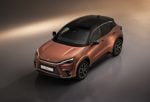Nissan believes it will have no difficulty in building a small car that will travel 62 miles on one litre of fuel – equivalent to about 280mpg and a performance that matches the best of the current hybrid cars.
The car will certainly be available in right-hand drive in Japan in 2010 and will be a conventional gasoline engine with what is described as a ‘next-generation’ high-efficiency turbocharger.
The engine will run on the Atkinson cycle – also used by the Toyota Prius – and have a high-compression/low-friction engine teamed with a constantly variable transmission, says Nissan international head of technology Mitsuhiko Yamashita.
While pledging to improve the company’s recycling as well as its emissions in an ‘aggressive’ programme, he maintains that other parties need to contribute.
He says changes in drivers’ behaviour could improve consumption and emissions by 50%. “Driver behaviour change is free. All technology change is very expensive,” he says.
He also believes traffic management could be improved and says London compares badly with Tokyo, where authorities work with the community and transport providers rather than in confrontation with them.
Unusually, Nissan disclosed details of its own carbon stain. Its global vehicle production generates 2,600 kilotons of C02 a year while its cars in service round the world are estimated to be generating 147,000 kilotons. The logistics network creates 1,200 kilotons a year. Offices are 10% of that.
Nissan does not believe hybrid electric vehicles can alone constitute a solution. Although their performance looks good on paper, deterioration of the battery means the range of the car is inevitably worse than expected.
Nissan is investing in its own lithium ion technology batteries and will start making them this month in a joint venture with NEC for future generations of electric vehicles.
Carlos Tavares, a Nissan vice president, says Nissan will produce a hybrid in 2010 and an electric car within a couple of years of that.
Like Ford, Nissan is pledged to multi-tasking technology rather than devoting resource to one solution alone. Fuel cell, hybrids, bio-fuel, electric, gas and diesel power units are all being developed.
A new clean diesel in the 2.0-litre class developed with Renault will reach the UK market this year.














Login to comment
Comments
No comments have been made yet.